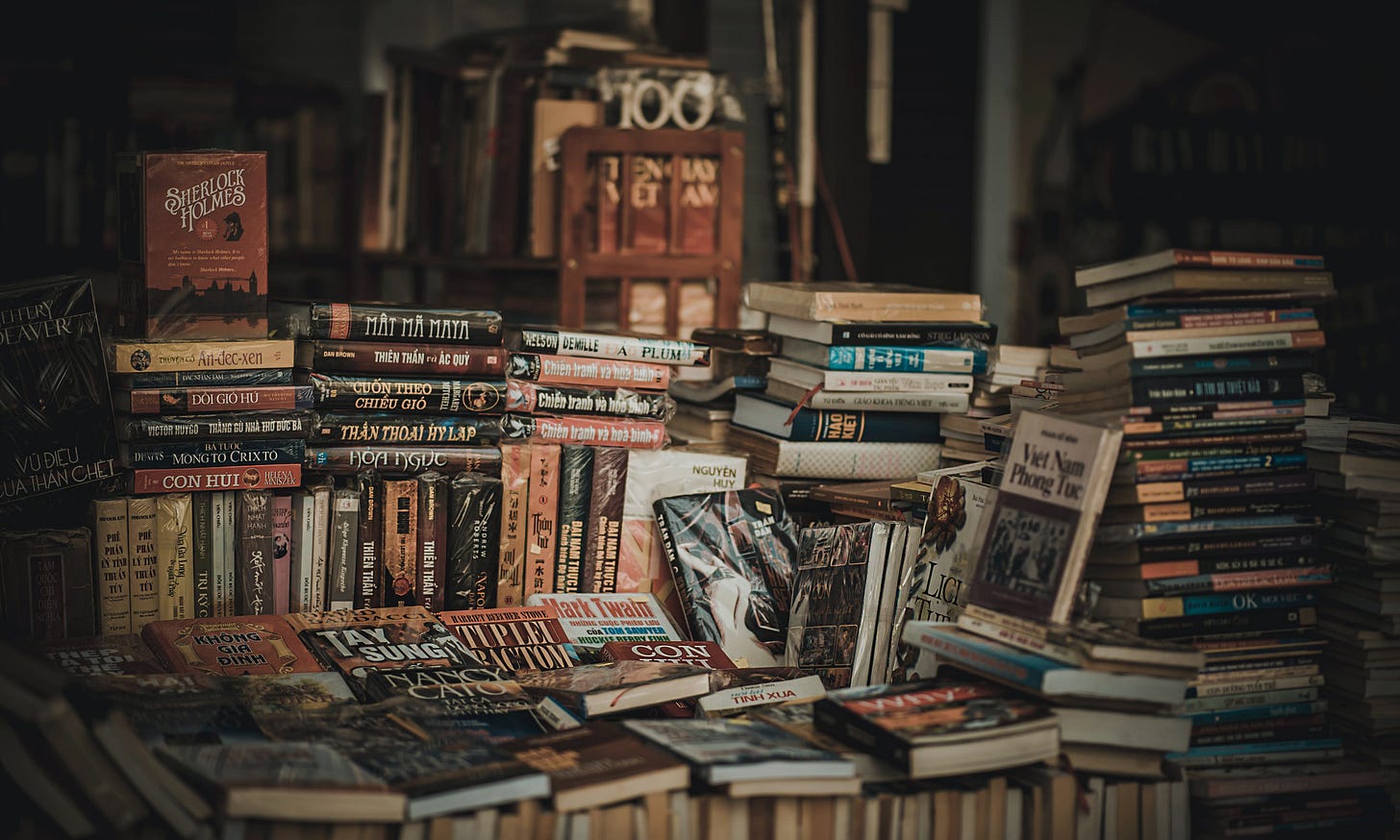How to Survive 2024
What's the "right" way to live through a high-conflict election year? Three lessons from a very wise conflict survivor.
I’ve been reading a lot of terrifying articles lately, and I’m guessing you have, too. They warn of a coming constitutional crisis in America, a possible genocide in the Middle East and a surge in homicides in Washington, DC, where I live. These threats are worthy of attention, beyond a doubt.
But even as we face the risks that will define 2024, it is also worth asking ourselves: how do we want to be in those conflicts?
I wonder that every day. To date, the best answer I have heard comes from a journalist named Victor Hugo Febres. I interviewed him a while back when I was writing about how journalists should cover politics in a hyperpolarized country, and I’ve never forgotten what he told me.
Time Travel
Febres had seen just about everything happening in America happen before—in Venezuela. A journalist, he had watched his fellow citizens turn on one another, bewitched by political polarization and manipulated by conflict entrepreneurs. “That is a dynamic that is very hard to avoid,” he said, sighing.
Just like in America, a magnetic political outsider had risen to power because the insiders were seen as corrupt and out of touch. In both places, media elites picked sides, becoming more and more opinionated and righteous--and less and less relevant. (As another longtime Venezuela correspondent once warned me: “When a country is divided into separate echo chambers, it doesn’t really matter how loudly you yell in one of them. They don’t hear you in the other.”)
At the time, Febres and his colleagues did many good things. They started a group for journalists who were trying to resist the spell of polarization and be of service to all of their audiences, even the ones they disagreed with. They made a list of practices that escalated the conflict, including the use of certain polarizing words or catch phrases—and urged reporters to avoid these traps. But it was a hard sell there, just as it is here.
Eventually, after he’d done everything he could think to do, he moved with his family to America in 2016. Just in time to see the same dynamic metastasize here. It was a cruel twist of fate.
But by the time I talked to him, he was sounding much more Zen than you might expect. He had learned a lot, and he generously shared three suggestions that could help all of us navigate the months ahead:
1. “Don’t let yourself be hijacked by the polarization. It will make you crazy.”
In Venezuela, Febres let the conflict define his life for too long, he said, blocking out other things that mattered. Since then, he’s spent a lot more time with his kids—and he’s learned to diversify his interests. “This polarization won’t define me as a person. Because to be part of that identity is to agree to a lot of fear and a lot of hate.”
He doesn’t like who he is when he gets hijacked by polarization. So now he watches the roller coaster ride of politics, keeping an eye out for threats and opportunities, but he doesn’t get on the ride.
That is easier said than done, I know. Which leads to rule number 2.

2. “Limit the amount of anguish you take on.”
Before you read a story or share a reel, ask yourself, how will this help me or others? Is there something I can do about this—or learn from this?
Don’t fool yourself into thinking that monitoring tragedy is, by itself, helping anyone. A few years back, social psychologist Adam Mastroianni realized he’d been under this exact delusion, as he described in his fantastic (and funny) newsletter Experimental History. “It kind of felt like my big contribution to the cause was reading and feeling bad. It was like I was floating above all the victims of every bad thing, going ‘Don’t worry everybody, I’m here to read all about you and feel awful!’”
I know exactly what he means! It’s an incredible trick of the mind, isn’t it? Eventually, he noticed that no matter how much he read—and how awful he felt—the bad news kept coming! So he dramatically reduced his news intake (as I have), and here is what he learned:
“[T]he world is full of bad things and you should do something about them. The news is just a bad way of figuring out what the bad things are and what to do about them. I am a son, a brother, an uncle, a partner, and a friend; I make my living teaching students and doing research. I actually matter in those small circles, and I understand what the problems are and what to do about them. I can literally change lives by trying to do good in my corner of the world, and reading the news distracts me from that.”
The news media covers a very narrow, distorted sliver of what is actually happening in the world. It is like trying to see your town through a peephole. You may glimpse something important every so often, but it will never be a full picture.
So now we’ve covered what not to do: don’t get hijacked and don’t absorb too much anguish. That leads us to my favorite insight of all: what to do instead.
3. “If you see something good to do, do it…And don’t expect a big result.”
In every high conflict, there are opportunities. But if we are enchanted by contempt, we miss them. We abandon our post, right when we are most needed.
To stay awake to the possibilities, we have to first accept that we are not in control of the conflict. That doesn’t mean we give up or stick our heads in the sand; it means that we disabuse ourselves of the grandiose belief that “I alone can fix” it.
The number of people who can depolarize a hyperpolarized country on their own is approximately…five (according to my careful calculations). You are not one of those people, and neither am I. Sadly.
“When a country is divided into separate echo chambers, it doesn’t really matter how loudly you yell in one of them. They don’t hear you in the other.”
“Understand the limits of your reach,” Febres counseled me. “We weren’t in a position to save [Venezuela]. A journalist doesn’t have that power.” (It hurts me even to read that quote, which suggests I have more acceptance to do.) What we can do is protect our sanity and our relationships so that when opportunities do arise, we can seize them.
For example: When we talk to our cousin who lives in a swing state but wasn’t planning on voting, we are ready to listen—and then share a story about why we vote. When we get a chance to support a candidate who is actively trying to restore dignity in American politics, we can knock on doors and spread the word. When our own elected official fails to condemn violence in their own party (which is the only thing that works, remember), we are ready with a carefully worded plea, asking them to do what’s right.
Poison Control
We have a choice to make. We could spend the next year in thrall to the same dread and rage to which we’ve become accustomed. This is a movie we have all seen before, after all. We know all the characters and their pathologies by heart. And that is one legitimate option--if it is serving you. Fear and fury can help motivate humans to donate or vote or protest. That may be worth the cost.
But I suspect that for most of us, there is nowhere new for that fear and fury to go. Instead, it can pull us under, into despair and hopelessness. Or it can come out sideways, when we scream at our toddler or lash out at a co-worker in a Slack channel. Pain like that usually finds the nearest target of convenience, whether it’s a boss or a barista—or ourselves.
Researchers have found that political partisans experience spikes in cortisol, the primary stress hormone, whenever their side loses. In high conflict, these cortisol injections become recurring. Every time you look at your phone, you feel threatened. And in these cases, cortisol acts like a toxin--impairing the immune system, degrading memory and concentration, weakening muscle tissue and bones and accelerating the onset of disease.
The thing is, it’s really hard to stop a genocide (or to parent a child or lead a congregation), when you’re in the hospital. So what then? What is the most sensible way to live in a time like this?
It won’t be nearly enough, by itself, but all it takes to break out of polarization is enough people doing small counter-cultural things at the same time.
Here’s to watching the roller coaster ride together in 2024,
Amanda
Book Therapy
I’ve never had a problem that wasn’t the subject of at least 12 good books. The problem is finding those books, in amongst all the truly terrible books. So in that spirit, here are a few of the books that are helping me make sense of the world these days…in hopes they might help you, too.
Losing Our Religion: An Altar Call for Evangelical America by Russell Moore
Former Southern Baptist pastor and Christianity Today editor-in-chief Russell Moore describes his own encounter with high conflict—and issues a plea for repentance and renewal in American evangelicalism. (I did not expect to laugh out loud while reading this book, and yet that is what happened!)
Feeling Great: The Revolutionary New Treatment for Depression and Anxiety by David D. Burns
This book (the new edition of the classic Feeling Good) is a manual to managing negative thoughts in scary times. It’s overly exuberant at times and very self-helpy, but if you can get past that, it’s a fantastic user’s guide for the human brain (and unlike just about every other book ever, it’s been proven to actually help people).
This came out in 2016, but I only discovered it recently. It’s a sort of travelogue, documenting the time that Archbishop Tutu traveled to the Dalai Lama's home in Dharamsala, India, to celebrate His Holiness's eightieth birthday. We get to listen as they ponder the nature of suffering, share what brings them joy and giggle (quite a lot).
What’s keeping you sane right now—books or otherwise? Share your recommendations in the comments below or email me at amanda@amandaripley.com.
© 2023 Amanda Ripley. See privacy, terms and information collection notice
Image Credit: Top photo by Alfred T. Palmer, US Office of War Information, via the Library of Congress








“Cortisol acts like a toxin....” explains exactly what I am experiencing. Very well put. Last week my online reading of articles and news had jumped to an all time high! Yikes. So in order to detox I binge watched 4 seasons of a crime show instead. On Vudu. Today I cleaned and organized stuff and did laundry and went grocery shopping. Then washed my hair. I feel great! Lol. Doing ordinary stuff in my own little ordinary way.
Great article!
I truly enjoy reading your books and hearing your insight about where things are today in our society and the world. I frequently suggest/promote others read your books, like "Unthinkable" and "High Conflict" when giving presentations on preparedness and de-escalation. I wish more people were able to recognize what is happening in our country at the moment and inoculate themselves against it with knowledge and a bit more levelheadedness. In the end, we are all Americans and generally all want what is best for our nation and her people, we may just have different ways in how we perceive we should get to those goals or end-states.